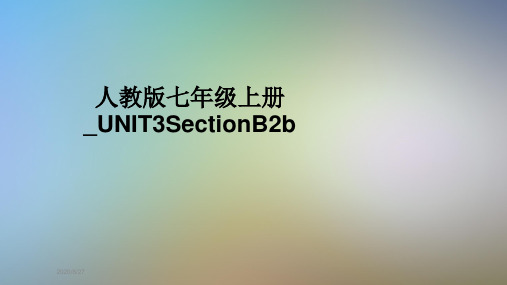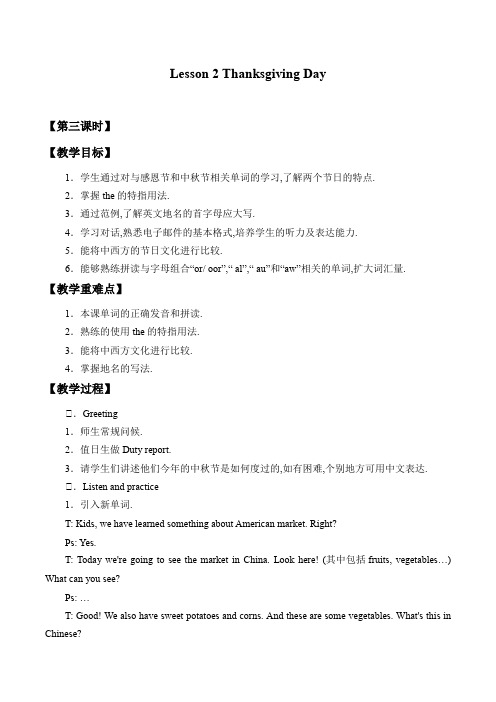Unit3 g2
- 格式:ppt
- 大小:1.45 MB
- 文档页数:42


B1U3 Keys to ExercisesWarm-up1.1) stressed 2) identity 3) involved with 4) belong 5) coping with6) feel 7) bind 8) defined 9) supporting 10) beautyScript:The philosopher Plato once said, “Music gives a soul to the universe, wings to the mind, flight to the imagination and life to everything.” Music has always been a big part of my life. To create and to perform music connects you to people countries and lifetimes away. It connects you to the people you are playing with, to your audience, and to yourself. When I’m happy, when I’m sad, when I’m bored, when I’m stressed, I listen to and I create music.When I was younger, I played piano; later, I took up guitar. And as I started high school, music became a part of my identity. I was in every band, I was involved with every musical fine arts event. Music surrounded me. It made me who I was, and it gave me a place to belong.When I first arrived at university, I felt lost. It’s like I had been taken out of my natural environment, and put somewhere new, where the rhythms and the harmonies and the form had gone away. And there was just me, silence, and my melody. But then the next moment — I could hear it. And I could feel it. And it was me. And I was here. Music is my way of coping with the changes in my life.There’s a beautiful connection between music and life. It can bind us to reality, at the same time it allows us to escape it. So you see, everything is music. When I look at the world, I see music all around us. When I look at myself, I see music. And my life has been defined by music. I found myself through music. Music is everywhere, and it is in everything. And it changes and it builds and it diminishes. But it’s always there, supporting us, connecting us to each other, and showing us the beauty of the universe. So if you ever feel lost, stop and listen for your song. 2. Answers may vary.Text AReading Comprehension1.1) b 2) c 3) a 4) e 5) f 6) d 7) j 8) g 9) h 10) i2. A. Einstein’s academic popularity:1)There is no other personality in the academic world that has even half Einstein’s popularity.2)There is no genius in the world as respected and as loved as Albert Einstein.3)Nowhere in the world could we find another academic that rivals the popularity of rocksuperstars.4)His opus “E=mc2” would rival any Beatles’ platinum record.5)His “Theory of Relativity” even shook Newton’s gravitational theory off the charts.B. Einstein’s love and gift for music:1)Had he lived later, he could easily pass as the only male member of the Bond electricQuartet.2)Had he not been a scientist, he would have been a musician.3)Einstein, with unclipped moustache and unkempt hair, did actually perform in soloconcerts!4)Einstein shone in a deeply felt performance of an adagio from one of the Beethovensonatas before his 17th birthday.5)In addition to his prowess on the violin, he also played the piano and, in particular, loved toimprovise.C. Einstein’s gift brought out by music:1)Albert Einstein believed that he got most joy in life out of music.2)Albert Einstein himself admitted that the reason he was so smart was because he playedthe violin.3)One friend, G. J. Whitrow, confided that the way Einstein dealt with problems andequations was by improvising on the violin.4)Einstein’s second wife, Elsa, said that music helped him when he was thinking about histheories.5)His son Hans said that Albert Einstein took refuge in music, which would usually resolve allhis difficulties.D. Music —Einstein’s lifelong passion:1)Einstein always had time for music and often performed at musical evenings when he wasyoung.2)Einstein’s violin remained his constant companion till 1950 when he had to stop playing theinstrument due to problems affecting his left hand.3)Einstein’s love and passion for music was so great that he once remarked that most joy inhis life had come from his violin.3.1)Nowhere in the world could we find another academic that rivals the popularity of rocksuperstars. His opus “E=mc2” would rival any Beatles’ platinum record, his “Theory of Relativity” even shook Newton’s gravitational theory off the charts. He admitted that the reason he was so smart was because he played the violin.2)Instead of heeding their advice, Albert’s parents boug ht him a violin.3)Playing the violin made him so smart. By improvising on the violin, Einstein dealt withproblems and equations. Music helped him when he was thinking about his theories. He would take refuge in music and that would usually resolve all his difficulties.4)Because Einstein actually started playing the violin at the age of six, had a lifelong passion forit till late in life, and played with more sincerity or deeper feeling than many other musicians.5)His commitment to music brought him most of the joy in his life and made him the greatestphysicist in the world.Language in Use4.1) G 2) M 3) A 4) C 5) K6) L 7) J 8) E 9) B 10) F5.1) deal with; bring out; coming from2) leading to; falling in love with; take refuge3) Instead of; In particular; In fact; heed the advice6.e) about f) back g) up h) in1) bring about 2) brought back/brings back 3) brought … up 4) brought forth5) bring out 6) bringing down 7) has brought in 8) brought forward/forth7.1) hardship 2) popularized 3) Creative 4) impression 5) significant6) admirable 7) simplify 8) musical 9) performances 10) professional8. Reference translation1)描述天才时,爱因斯坦是你能找到的最合适的例子,就连小孩都熟悉他。



Lesson 2 Thanksgiving Day【第三课时】【教学目标】1.学生通过对与感恩节和中秋节相关单词的学习,了解两个节日的特点.2.掌握the的特指用法.3.通过范例,了解英文地名的首字母应大写.4.学习对话,熟悉电子邮件的基本格式,培养学生的听力及表达能力.5.能将中西方的节日文化进行比较.6.能够熟练拼读与字母组合“or/ oor”,“ al”,“ au”和“aw”相关的单词,扩大词汇量.【教学重难点】1.本课单词的正确发音和拼读.2.熟练的使用the的特指用法.3.能将中西方文化进行比较.4.掌握地名的写法.【教学过程】Ⅰ.Greeting1.师生常规问候.2.值日生做Duty report.3.请学生们讲述他们今年的中秋节是如何度过的,如有困难,个别地方可用中文表达.Ⅰ.Listen and practice1.引入新单词.T: Kids, we have learned something about American market. Right?Ps: Yes.T: Today we're going to see the market in China. Look here! (其中包括fruits, vegetables…) What can you see?Ps: …T: Good! We also have sweet potatoes and corns. And these are some vegetables. What's this in Chinese?Ps:卷心菜.T: In English ,we call it cabbage.Ps: Cabbage.T; Now read after me, cabbage.用同样的方法教学单词lettuce.2.巩固新单词.(1)在黑板上贴出多种食物的图片(包括本课所学的),请学生分别找出西方特有的、中国特有的和中西方共有的食物.(2)记忆游戏:全班分为两组,轮流发言,第二组需在重复第一组先说内容的基础上增添一个新词,如:G1: We like corn.G2: We like corn and turkey.G3: We like corn, turkey and pumpkin pie.3.完成Workbook中的Listen and number.Ⅰ.Listen and write.1.学生看课件图猜主题.2.教师一边读小诗一遍画画,帮助学生了解小诗大意.3.学生跟读,教师解读.T: Well done! Now let's make a little change. Can we use another word for “merrily”?Ps: Look at that boy in the picture. He is merrily smiling. Then look at me, I am sadly smiling. (通过表情变化帮助学生理解) So merrily means…Ps: Happily.T: Clever! Then how about the last line “enjoy the night”? What do you do to enjoy the night?Ps: Play with friends or parents. /Watch the moon. /have delicious food. (教师可先举例进行提示)T: Good! It seems all of you know how to enjoy the night.4.小组活动.四人一组,两人读小诗,两人表演.Ⅰ.Read and make your own ad.T: We have talked so much about Mid-autumn Festival. Now boys and girls, look at this picture. Can you guess what the picture is? Is it a card?Ps: Birthday card, post card…T: Can it be an ad? (会不会是一则广告呢?)PS: Yes.T: I think so. If it is an ad, what's it about? What does the girl want?Ps: Meat, egg…T: Now you can have a discussion in pairs.What does the girl want and why?(参与学生讨论,可适当给出提示)T: P1, can you tell me your guess?P1: She wants moon cakes.T: Why?P1: It's always the best.T: Class, do you agree with him /her?Ps: Yes.T: I agree with you too. And what do the moon cakes have?Ps: Meat, egg, nuts and fruits.T: Great! Do you like this ad?Ps: Yes.T: OK! After class I'd like you to design your ad for moon cakes, and show it to us next time, will you?Ps: Yes.Ⅰ.Look, listen and say.1.复习上节课所学的字母组合“ ar”,“ er”,“ ur”和“ ir”的发音.2.出示图片,让学生读出单词并自己拼写单词.3.学生仔细听录音,然后再模仿,教师订正.4.教师引导学生总结发音规则.5.给出一些没有学过的单词让学生尝试拼读,不要求他们掌握中文意思.【作业布置】为家长表演小诗并请家长打分.。

人教版三年级下小学英语全英文教案Unit 1 Welcome back to schoolUnit 2 My Family Teaching Aims:1.Be able to understand and say: This is my family. Who’s that man(woman)? He’s/She’s my…Who’s this boy(girl)? He’s/ She’s my… Come on! Let’s watch T V. Be able to use them in the real situation with the natural tones.2.Be able to listen, say and recognize the main words: father(dad), mother(mom), man, woman, grandfather(grandpa),grandmother(grandma), brother, sister.3.Be able to use the interjection correctly: “ Great!/ Cool!/ Oh!/ Wow!” to express the emotion.4.Be able to listen, say, read and write letters F-I, understand and say the words which begin with F-I, eg: fish, father, goose, girl, hamburger, hot dog, ice-cream, ice.Lesson arrangement:Lesson One: Part A Let’s learn; Let’s sing; Part C CultureLesson Two: Part A Let’s talk ; Let’s practiseLesson Three: Part A Let’s say; Let’s chantLesson Four: Part B Let’s learn; Let’s chant; Part C Story time Lesson Five: Part B Let’s talk ; Let’s pr actise.Lesson Six: Part B Let’s say; Let’s do; Part C Let’s checkUnit 3 How many?Teaching Aims:1.Be able to understand and say: How many …can you see? I can see… How many…do you have? I have… Be able to use them in the real situation with the natural tones.2.Be able to listen, say and recognize the number words:11-20, and use them in daily life.3.Be able to understand and use the phrase which can praise other ones: “ It’s beautiful! How nice!” and use them in the proper situation.4.Be able to listen, say, read and write letters J-M, understand and say the words which begin with J-M eg: jeep, jump, kangaroo, key, lion, lock, milk, mouse, night, nest.5.Be able to understand the orders, and do the actions according to the orders.Lesson arrangement:Lesson One: Part A Let’s learn; Let’s play; Let’s sing.Lesson Two: Part A Let’s talk ; Let’s practiseLesson Three: Part A Let’s say; Part C Story timeLesson Four: Part B Let’s learn; Part C CultureLesson Five: Part B Let’s talk ; Let’s practise.Lesson Six: Part B Let’s say; Let’s do; Part C Let’s check。
七年级Unit3知识点1.Excuseme,Grace.打扰了,格雷丝。
1)excuse me意为“劳驾;请原谅”,是打扰他人前的客套话,以示礼貌和歉意,主要用于:(1)询问情况,引起别人的注意,如问路,问姓名等。
Excuseme,are you Mr.Smith? 请问,你是史密斯先生吗?(2)征求别人的许可,向对方提出要求。
Excuse me,May I ask you somequestion? 打扰了!我可以问你几个问题吗?(3)打扰别人,打断别人的讲话或正在做的事。
Excuse me!I want to wash my hands. 对不起!我想要洗手。
辨析:excuse me与I’m sorry.excuse me多用于麻烦,打扰或有求于人通常用于打扰他人之前可用于打扰他人之后I’m sorry指因做错了事,心中难过,有愧于莫人或莫事而道歉---Excuse me,what’sthis in English?打扰一下,这个用英语怎么说?---I’m sorry.I don’tknow.对不起,我不知道。
I’m sorry I left my wallet at home. 对不起,我把钱包落在家里了。
---______.Is this yourbook?---Yes,it is.Thankyou!A.SorryB.HelloC.Excuse me解析:我们可采用“情景交际法”解答本题。
由Is this your book?(这是你的书吗)知这是询问别人问题。
在询问别人之前,应先用excuse me(打扰了,劳驾)以示礼貌,故选C.答案:C2)me是人称代词宾格,意为“我”,通常用在动词或介词之后做宾语,其主格形式为I。
Please help me.请帮帮我。
My friend showed(给……看)______some old photos of hisfamily.A.myB.IC.meD.mine解析:我们可采用“语法分析法”解答本题。
八年级上册教案设计Unit 3 Our HobbiesTopic 2 What sweet music!Section CⅠ. Material analysis本节课主要活动为1a和2b。
Section A 通过歌手席琳·迪翁谈论音乐会,Section B谈论不同风格的音乐,在内容上Section C是对Section A 和Section B的升华,从音乐会到不同形式的音乐再到人们熟悉的伟大作曲家莫扎特,通过层层递进的方式步步拓展到阅读和写作的综合能力的培养。
在培养学生能力的方面也从培养学生听说能力过渡到培养写作能力。
老师们在设计课堂的时候应用教材上所设计的表格和问题等多种读中和读后活动。
以此为基础,通过竞赛、将自己已有知识和文章进行对比等方式,逐一完成信息输入、阅读技能培养、信息输出的过程。
Ⅱ. Teaching aimsKnowledge aims:1. 在图片、同义句替换等方式的帮助下,能自己拼读下列单词:age,wonder,note,papa,press,smile,amazing。
2. 能通过游戏快速记忆本课生词,如:wonder,note,smile,understand等。
3. 能在练习中使用感叹句表达自己的情感。
4. 能够用感叹句评价某人或某物。
Skill aims:1.能基本听懂本课文本材料,及与其水平相当的伟人介绍。
2. 能流利地和他人谈论自己或朋友喜欢的音乐家。
3. 能正确地使用因特网、能从中获取有用信息并基本读懂其中介绍音乐家的文章。
4. 能正确模仿本课课文,有条理地写出自己喜欢的音乐家的故事。
Emotional aims:通过对伟大人物事迹的学习,从伟人平凡的故事当中领悟做人做事的态度。
明白天才源于汗水和努力。
Ⅲ. The key points and difficult pointsKey points:1. 用感叹句表达自己的情感。
2. 根据关键词复述文章,如:composer,start writing,a child等。